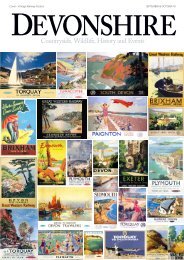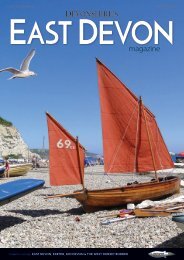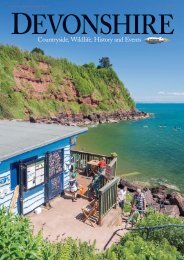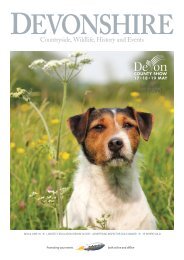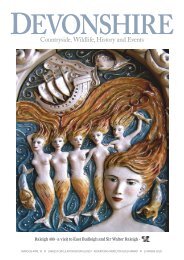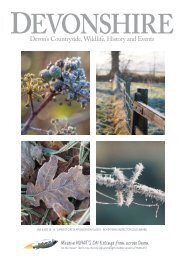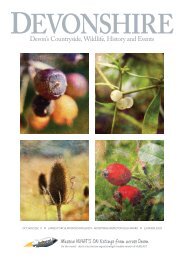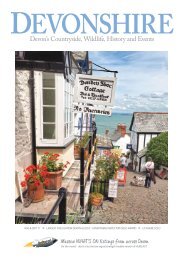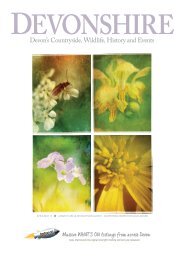Devonshire's East Devon magazine September October 2018
You also want an ePaper? Increase the reach of your titles
YUMPU automatically turns print PDFs into web optimized ePapers that Google loves.
floodgates were opened to the<br />
masses for seaside holidays.<br />
Of course the train was not<br />
the only option; you may have<br />
seen old Pathe News film of<br />
the working classes cramming<br />
into buses, the men resplendent<br />
in their best suits, knotted<br />
handkerchiefs strategically<br />
placed to soak up the<br />
sweat. The heat would<br />
have been stifling<br />
- how easily we forget<br />
that air-conditioning<br />
is a relatively modern<br />
addition to travel.<br />
You can be fairly certain that the<br />
upper classes would have viewed<br />
these garish, rowdy visitors with<br />
disdain, heralding the end of an<br />
era for them. If you take a careful<br />
look at seaside towns such as<br />
Torquay and Sidmouth for<br />
instance, it's evident they were<br />
upmarket destinations and must<br />
have been extremely beautiful,<br />
our Victorian predecessors<br />
having great interest in exotic<br />
trees and architecture. Many of<br />
the 19th century buildings were<br />
expensively designed and built,<br />
some not looking out of place<br />
in our capital, complete with<br />
elegant pilasters and ornamental<br />
More than<br />
a touch<br />
of cheek<br />
here - the<br />
globe shows<br />
Teignmouth<br />
in large<br />
lettering,<br />
with<br />
Torquay<br />
in much<br />
diminished<br />
type. Again<br />
town<br />
councils<br />
fighting for<br />
a bit of the<br />
trade.<br />
Stretching a point - 'The<br />
Mentone of England' - do you<br />
know where Mentone is?<br />
cornice decoration. In the 1800s<br />
and up until the early 1900s the<br />
prosperous British Empire will<br />
certainly have enabled many<br />
wealthy individuals to build their<br />
own elegant seaside villas. The<br />
development of these towns<br />
would have been further boosted<br />
by the Napoleonic Wars in the<br />
early 1800s, which prevented<br />
The Holidays with Pay Act<br />
certainly heralded a boom in the<br />
seaside tourist industry<br />
wealthy individuals from<br />
travelling abroad. The railways<br />
will have helped greatly in<br />
facilitating the building of these<br />
grand villas, allowing materials<br />
to be easily transported from<br />
from other parts of Britain.<br />
Returning to the subject in hand,<br />
old railway posters created in<br />
the golden age of rail travel, the<br />
railway companies realised that<br />
there were massive opportunities<br />
to be exploited. Promoting their<br />
own lines and destinations made<br />
good commercial sense. Posters<br />
were one way of marketing their<br />
offerings and you can see from<br />
And why shouldn't one find<br />
romance on holiday? North<br />
<strong>Devon</strong> was obviously the place<br />
for it - online dating didn't<br />
exist then (thankfully!).<br />
some of the posters shown<br />
that the earlier posters were<br />
fairly primitive in their design<br />
and execution, but they must<br />
have been effective because<br />
you are able to see a massive<br />
improvement, with some of the<br />
artistry employed being of an<br />
extremely high standard. I'm<br />
sure you'll agree that many are<br />
beautiful and worthy<br />
in their own right to<br />
be considered works<br />
of art.<br />
Of tremendous help<br />
to the artist is the<br />
fact that <strong>Devon</strong>'s an<br />
extremely attractive county and<br />
at the time even more so, covered<br />
with hedgerows, orchards, large<br />
trees, sleepy rural villages and<br />
farms, the journey through mid<br />
20th century countryside must<br />
have been absolutely heavenly.<br />
It's great to see how the<br />
marketing men put their heads<br />
together at the time, carefully<br />
tailoring the messages built<br />
into these posters. The finest<br />
evolution is where the artists<br />
were given free reign to visually<br />
extol the natural virtues of this<br />
glorious county.<br />
Editor<br />
An absolutely charming<br />
early poster, the fish<br />
family. The umberella's<br />
a clever idea, adding a<br />
touch of colour.<br />
The artist has made Brixham<br />
beautiful! The sails, colours,<br />
superb. Let's make no mistake, tons<br />
of fish actually stank, but it's what<br />
the marketing men (sorry women<br />
also) did. Dress it up to look lovely<br />
- good work guys, that's not to say<br />
Brixham isn't lovely, it certainly is.<br />
Some of the fish landed at Brixham, a<br />
major UK port for the fish industry.<br />
Appealing<br />
to redblooded<br />
males<br />
perhaps?<br />
Today,<br />
this sort of<br />
imagery is<br />
positively<br />
frowned<br />
upon.<br />
Yes indeed, <strong>Devon</strong>'s a glorious<br />
place, who wouldn't wish to visit?<br />
hubcast<br />
<strong>Devon</strong>, a British Rail poster by the<br />
What’s artist on in A. <strong>Devon</strong> Johnston<br />
.co.u k<br />
63









